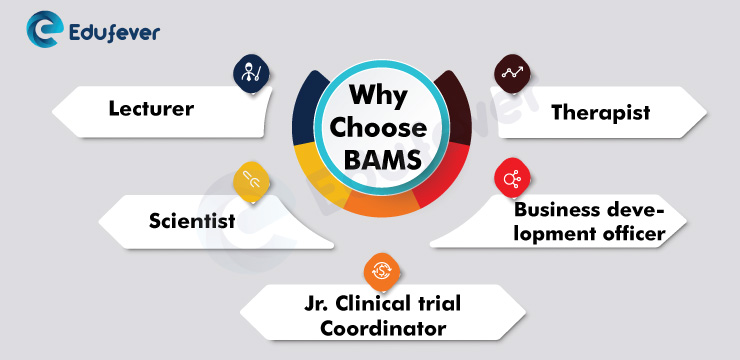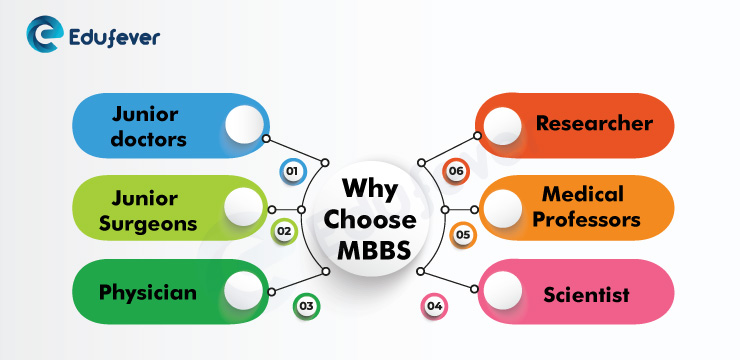BAMS Vs MBBS: An MBBS doctor is a prestigious and well-respected member of society, and they typically work in hospitals, medical centres, or research institutes. The BAMS course, on the other hand, provides graduates with a bright future in addition to providing insights into human anatomy and physiology. It is a 5- and six-month degree programme broken down into four and half years for the academic session plus one year of mandatory internship. In India, the doctor’s profession is held in the highest regard. So, each year, thousands of students put in much effort to prepare for the NEET exam to pursue medical courses after class 12. Naturally, their minds might be confused about which field to pursue. To reduce your confusion, this article will guide you on which area is better, BAMS or MBBS.
[Page Index]
BAMS Vs MBBS Course Overview
The following is a summary of the BAMS or MBBS course overview:
| Course | MBBS | BAMS |
|---|---|---|
| Full Form | Bachelor of Medicine and Bachelor of Surgery | Bachelor of Ayurvedic Medicine & Surgery |
| Duration | 5.5 Years | 5 years 6 months |
| Eligibility Criteria | 50% or above in 10+2 in PCM/PCB with English as a mandatory subject | 10+2 with a minimum of 50%. Compulsory subjects include Physics, Chemistry, Biology |
| Average Fees | INR 5-12 Lakhs per annum | INR 1-3 Lakhs per annum |
| Admission Criteria | NEET UG | NEET UG |
| Career Opportunities | Physician Doctor, Endocrinologist, Pathologist, Neurologist, Cardiologist, Gynaecologist | Medical Representative, Product Manager, Pharmacist, Resident Medical Officer |
| Recruiting Companies | Medanta Hospitals, Fortis Healthcare Ltd, Apollo Munich Health Industries Co Ltd, Sun Pharmaceutical Industries Ltd, Cipla Ltd, etc. | Patanjali Ayurved Limited Dabur, The Himalaya Drug Company, Zandu Pharmaceuticals Works Limited, Surya Herbal Limited |
Why Choose BAMS Course?
BAMS stands for Bachelor of Ayurvedic, Medicine and Surgery and is a degree program at an undergraduate level that trains aspiring candidates in Ayurveda and Ayurvedic medicine. The BAMS course lasts for 5.5 years with a mandatory one-year internship. The course is divided into four professionals over 5.5 years. Day by day, the scope of Ayurveda overlaps with other medical systems in India and the world. In many cases, people have taken the experience for the trustfulness of the Ayurvedic system and medicines treating chronic and non-healable diseases. When the allopathic system often fails with a particular disease and surrenders, Ayurvedic medicine does an enchanting effect to rejuvenate the illness or the patient.

Why Choose MBBS Course?
MBBS (Bachelor of Medicine and Bachelor of Surgery) graduates are trained thoroughly to treat ailments such as colds. Cough, stomach ache, bruises, etc. They can start their practice and treat patients. After completing the MBBS, graduates can pursue further studies for MS or MD degrees with specializations like Cardiology. Neurology. Gynaecology. Endocrinology, Immunology. Radiology, Psychiatry. etc., and you can expect employment in areas such as private hospitals and government hospitals. These graduates also have a massive demand in sports medicine, health research journalism, hospital management, medical academics, public health policy-making, and much more. One can also opt to take part in clinical trials or build a career in any of these fields:

BAMS Vs MBBS Admission Procedure in India
When you check the reasons for choosing MBBS or BAMS, it’s time to review the difference between the BAMS and MBBS admission procedures to get admission to top BAMS colleges in India and MBBS colleges in India; let’s see.
| Particular | How do you get admission to the BAMS Course? | How do you get admission to the MBBS Course? |
|---|---|---|
| Entrance Exam | Candidates should have a NEET scorecard. | Candidates should have a NEET scorecard. |
| Counselling | After qualifying for the NEET examination, candidates must participate in Ayush NEET Counselling conducted by AACCC Central Counselling (AACCC) or State Counselling (AYUSH Dept. of respective State). | After qualifying for the NEET examination, applicants must participate in NEET Counselling conducted by the Medical Counselling Committee (MCC) or State Counselling (Medical Dept. of respective State). |
BAMS Vs MBBS Eligibility Criteria in India
When you check the reasons for choosing MBBS or BAMS, it’s time to review the difference between the BAMS and MBBS eligibility criteria to get admission to top BAMS colleges in India and MBBS colleges in India; let’s see.
| Particular | BAMS Eligibility Criteria | MBBS Eligibility Criteria |
|---|---|---|
| Eligibility | Aspiring candidates should have passed from 10+2 with a minimum of 50% aggregate marks in the science stream (PCB) to be eligible for the BAMS course. | Aspirants must have passed Class XII/higher secondary/pre-university qualifying examination with Science subjects, i.e. Physics, Chemistry and Zoology/Botany. They also must have studied English as the main subject for their qualifying examination. |
| Age Limit | A minimum age limit of 17 years | A minimum age limit of 17 years |
Difference Between BAMS and MBBS Syllabus in India
When you check the admission procedure and eligibility criteria for MBBS or BAMS, it’s time to review the difference between the BAMS and MBBS syllabus; the curriculum of the courses you should study while studying. Let’s check out.
| Year | BAMS Syllabus | MBBS Syllabus |
|---|---|---|
| 1st Year | Padartha Vigyan Evum Ayurveda Itihas Sanskrit Kriya Sharir (Physiology) Rachana Sharir (Anatomy) Maulik Siddhant Avum Ashtang Hridya (Basic Principles and Ashtanga Hridaya- An Ancient Text of Ayurveda) | Anatomy Biochemistry Physiology |
| 2nd Year | Dravyaguna Vigyan (Pharmacology and Materia Medica) Agadantra, Vyavahar-Ayurved Evum Vidhivaidyak (Toxicology, Forensic Medicine and Medical Jurisprudence) Rasashatra Evam Bhaishajyakalpana (Iatrochemistry and Ayurvedic Pharmaceutics) Charak Samhita-Purvardha (Sutrasthana, Nidanasthana, Vimanasthana, Sharirasthana and Indriyasthana) | Community Medicine Pharmacology Pathology Microbiology Forensic Medicine and Toxicology Clinical postings inward OPD |
| Learn More | BAMS Syllabus in Detail | MBBS Syllabus in Detail |
BAMS Vs MBBS: Top Colleges in India
There are 650 medical colleges in India and 273 BAMS colleges in India. The colleges for MBBS and BAMS differ, and the colleges that provide the courses are mentioned separately with NIRF Rankings.
Top MBBS Colleges in India by NIRF Ranking
In this section, we will provide detailed information about the Top MBBS colleges in India’ let’s have a look.
| Name | City | State | Score | Rank |
| All India Institute of Medical Sciences, Delhi | New Delhi | Delhi | 91.60 | 1 |
| Post Graduate Institute of Medical Education and Research | Chandigarh | Chandigarh | 79.00 | 2 |
| Christian Medical College | Vellore | Tamil Nadu | 72.84 | 3 |
| National Institute of Mental Health & Neuro Sciences, Bangalore | Bangalore | Karnataka | 71.56 | 4 |
| IMS BHU Varanasi | Varanasi | Uttar Pradesh | 68.12 | 5 |
| Jawaharlal Institute of Post-Graduate Medical Education & Research | Puducherry | Pondicherry | 67.64 | 6 |
| Sanjay Gandhi Postgraduate Institute of Medical Sciences | Lucknow | Uttar Pradesh | 67.18 | 7 |
| Amrita School of Medicine Kochi | Coimbatore | Tamil Nadu | 66.49 | 8 |
| Sree Chitra Tirunal Institute for Medical Sciences and Technology, Thiruvananthapuram | Thiruvananthapuram | Kerala | 65.17 | 9 |
| Kasturba Medical College, Manipal | Manipal | Karnataka | 63.89 | 10 |
Top BAMS Colleges in India
In this section, we will provide detailed information about the Top BAMS colleges in India’ let’s have a look.
| College Name | Location |
|---|---|
| Faculty of Ayurveda BHU | Varanasi |
| Dr DY Patil College of Ayurved & Research Institute & Hospital | Pune |
| Madhav Ayurveda Medical College | Rajasthan |
| Parul Institute of Ayurved Vadodara | Vadodara |
| Rajiv Gandhi Ayurveda Medical College & Hospital Mahe | Manipal |
| Patanjali Ayurved College | Haridwar |
| Sumatibhai Shah Ayurved Mahavidyalaya | Pune |
| SCSVMV University | Kanchipuram |
BAMS Vs MBBS: Job Profile & Salary
This section will provide detailed information about the BAMS and MBBS course job profiles and average salary after completing the courses.
Job Profile for BAMS
The following are the job profiles for the BAMS course:
| Ayurvedic Doctor | Ayurvedic Physician |
| Lecturer | Research Assistant |
| Scientist | Professor |
| Pharmacist | Therapist |
| – | Medical Officer |
Average Salary for BAMS
The following is the average salary for BAMS
| Salary | Average Salary |
|---|---|
| Lowest Salary | INR 1.6 LPA |
| Highest Salary | INR 10 LPA |
| Average Salary | INR 3.1 LPA |
Job Profile for MBBS
The following are the job profiles for the MBBS course:
| General Physician | Medical Professor/ Teacher |
| Medical Officer | Researcher |
| Dermatologist | Public Health Care Worker / Public Servant |
| Medical Coder | Dietician |
Average Salary for MBBS
The following is the average salary for MBBS:
| Sector | Average Salary |
|---|---|
| Government Sector | INR 20,000-80,000 |
| Private Sector | INR 20,000-50,000 |


I am an Ayurvedic doctor with an MD Ayurveda degree. Sorry to say but the list of top BAMS colleges in India mentioned in the article is misleading. After BHU (Varanasi) the best colleges are
1. National Institute of Ayurveda (NIA), Jaipur (Rajasthan)
2. R.A. Podar Ayurvedic College, Mumbai (Maharashtra)
3. Tilak Ayurved Mahavidyalaya, Pune (Maharashtra)
Even Ayurveda Mahavidyalaya, Sion (Maharashtra) is one of the best colleges in India if not at par with the above 3 colleges but should be mentioned in your list.
D.Y. Patil is a private college based in Maharashtra. In fact, people keep it as the last option if they do not get into a Govt. Ayurvedic college in Maharashtra.
Please do a thorough research and then update the article. You can get in touch with recently passed-out Ayurvedic doctors, preferably from Maharashtra, and then ask them if you have missed out on any more colleges.
Thanks for the improvement, we have mentioned some of the ayush college not rank wise bams college.
Want to know about Ayush councelling registration
Ayush registration has not started yet, You can get complete Ayush counselling details from here Downtown ebook: https://shop.edufever.com/book/neet/aaccc-ayush-neet-counselling-guide-ebook/
Mbbs or bams milakar ek digri crouse hona chahie
Dono course me kisi ek course ko hi kr skte h aap
Can a Delhi based B.A.M.S doctor use the allopethic medicine ?
Ayush doctors, who are practitioners of traditional Indian systems of medicine such as Ayurveda, Yoga, and Naturopathy, generally do not recommend allopathic medicine.
Ayush practitioners are trained in their respective systems of medicine and prescribe treatments based on the principles and practices of those systems. These treatments can include herbal remedies, dietary changes, lifestyle modifications, yoga and other forms of exercise, and other natural therapies.
However, there may be situations where an Ayush practitioner may recommend allopathic medicine in addition to their traditional treatments. For example, in the case of a medical emergency or a condition that requires immediate intervention, an Ayush practitioner may recommend allopathic medicine to stabilize the patient’s condition before continuing with traditional treatment. In such cases, the Ayush practitioner may work in conjunction with a qualified allopathic doctor to provide the best possible care for the patient.